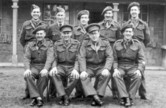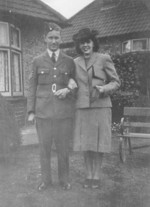
Soon after the outbreak of war I joined the RAF as an Aircrafthand General Duties. Basic training was at a place called Padgate, in Lancashire. At the end of the six weeks training we were posted to various RAF stations around the country. When the postings were announced I happened to be away on sick leave. This was in the winter of 1939/40, and the Padgate camp was perpetually enshrouded in fog, and the fog, coupled with the severe frosts, caused me to develop what was known as the 'Padgate cough'. On returning to camp, I discovered I was to be posted to Montrose, in Scotland. However, there happened to be a Scotsman in the hut where we were billeted who had been allocated to RAF Grantham, in Lincolnshire, and we decided we would go to the orderly room to see if we could exchange postings. This we succeeded in doing, but the other occupants of the hut were not very pleased as, unknown to me, they had been told that postings could not be changed. So I went to Grantham and the Scotsman went to Montrose. The RAF Station was at Spittalgate, Grantham, and shortly after arriving it was discovered that I could write shorthand and type, and after passing the appropriate examination I was re-mustered to the trade of Clerk General Duties. The typewriter in the Orderly Room as an old English Oliver machine. I could not type at any speed with that machine which went 'clop, clop', so next time I went home on leave I bought, in Reading, an American typewriter, a Royal I think it was, and took it to the Orderly Room where I worked, when I went back to the RAF Unit, 'Camp' as we called it, at Grantham. I could then do a lot of typing work.
On the whole I liked the life and although I looked forward to going home on leave, I liked going back to Camp where I seemed to find a different kind of freedom from that of civilian life. I particularly liked Christmas on the Unit and later on when I got promotion to the rank of Corporal and worked in the Orderly Room and could more or less organise my own leave, I used to postpone my Christmas on the Unit instead of going home (I used to find Christmas at home very boring). Of course, all who were not above the rank of corporal had to do Guard Duties at night every so often, and come back to our daily work after getting a couple of hours sleep in the barracks. The NCO in charge of the Orderly Room was usually a flight sergeant; the NCO in charge of the Flying Wing Headquarters was a Corporal, and later on I got that job. I had a couple of very pleasant WAAF ladies on my staff, as well as some males. The Flying Wing Headquarters was situated near the airfield and just behind the Watch Office in which the flying controllers were situated. Occasionally I was flown to Woodley Airfield, near Reading, when going on leave. The aircraft would be either an Anson or Oxford.
The RAF Station at Spittalgate was on top of a steep hill, and about half way up an enterprising man had erected a wooden hut, affectionately known as Smokey Joe's, just inside the gate of a field close by the roadside, in which he brewed endless cups of tea for sale to the weary RAF men toiling up the hill on their way back to camp from the town where they had been spending the evening when off duty or had been returning from leave. The Station warrant officer (SWO) was a man of very long service who had served in many parts of the world, and I believe he was the only person serving on the Station with a four figure service number. He had a bronzed face and a very loud voice, and when he called 'markers' for the morning working parade I should think his voice could be heard half a mile away. One thing that stands out in my memory is looking out of the window of the barrack room which overlooked the parade ground one very hot day and seeing a poor chap doing punishment drill with full pack and with the SWO bellowing at him and the sweat pouring down his neck. Punishment drill was abolished soon after.
When laying in bed at night at the barracks I used to listen for a time to the beat of the LNER 3-cylinder 4-6-2 locomotives, six beats for each revolution of the coupled wheels, hauling the trains, which were very heavy in those days, up the bank from Grantham towards Stoke and the summit at Stoke tunnel on their way to London, Kings Cross. I often travelled by train from Grantham when going on leave, and I usually looked out as we passed through Werrington Junction, near what was called Peterborough North. I noticed the signals had what were called 'somersault' arms, which I supposed were originally Great Northern type. The railway branch from the main line towards the east at Werrington Junction was then called the M & GN (Midland and Great Northern). I used that line at least once and remember looking out of the carriage window as we were leaving the main line at Werrington Junction when I saw the Flying Fox at the head of an express passenger train as it was steaming north on the main line. This to me was one of those thrilling sights which I remember. It was on the M & GN that, while looking out of the train windows at appropriate points on single line sections, I noticed the automatic exchange of single line tablets, the train still running at, I think, normal speed: an apparatus was fitted on the side of the locomotive as well as on the line side at the point of exchange.
Once, I visited Grandfather Brooks at Bury St Edmunds, Suffolk. He had previously lived at Saffron Walden in Essex. When I left him to go back to Grantham I suddenly had an impulse and turning around I saluted him as he waved 'goodbye'. I never saw him again; he died on 15 January 1942, his age being ninety-four years.
While I was stationed at RAF Grantham I visited Nottingham during the weekend. The trains from Grantham went on a branch line to Nottingham Victoria station. Victoria was huge with a glass roof and I found it very interesting to watch the freight trains as well as passenger trains going through the station. Nottingham Victoria was on what was originally the Great Central Railway. Trains from Grantham, LNER (originally GNR) joined the originally GCR at a Junction called Weekday Cross from where they ran into Victoria station through a tunnel. At the end of the tunnel was a fairly large signalbox at the northern end of the station, and at the southern end of the station there was a similar large signalbox. I also noticed a signalbox unusually situated on a platform. Victoria station at Nottingham no longer exists. In Nottingham I saw the very old public house called 'Ye Olde Trip to Jerusalem' which is just underneath the walls of the castle.
In May/June 1943, I was sent from RAF Grantham to RAF Redcar, Yorkshire, to go on a NCO course which lasted about three weeks. On the way up from Grantham I had to change at Darlington for a branch line train to Redcar. In Redcar we were accommodated in empty houses. We had to clean the windows and to do that we sprayed water over them by using stirrup pumps! Once a week we were marched to the swimming pool where we were all paraded nakedly to have a bath. On the course, we had to train as a drill instructor, each one of us taking a turn at drilling the rest of us. We also had to do a lot of writing of what we were taught; my hand felt it would eventually get cramp with so much writing. I played Chess with a very nice gentleman who lived at Marske, a place near Redcar, and he invited me to his home from time to time. Having completed the course I was sent back to Grantham.

For a time we were taken away from the barracks at Spittelgate, Grantham, and after our duties each day we were taken by RAF buses to Stoke Rochford Hall where beds had been put in the basement of the hall, then back to Spittalgate by bus each morning. I was a corporal and I and the other corporals had to take a turn in getting up very early in the morning, around 5.30 am, and wake up everybody else so that we were all ready for the buses to take us to work at Spittalgate. At some time we were in huts at Harlaxton, not far outside Grantham. Why these changes were made I have no idea, but I think we got back to the barracks a short time later. Although I did visit the Baptist Church at Grantham I attended the Congregational Church quite a lot. The Minister, Reverend Child, invited me to his home and he gave me a small pipe which introduced me to pipe smoking. He gave me what he called 'bedding' to smoke and which one could get from a Heath & Heather shop. It crackled like a bonfire and smelt awful! Of course, I soon started smoking proper tobacco.
I was never posted abroad, though I did apply for a post to Western Europe towards the end of hostilities, but instead I was posted to a unit at a place called Blakehill Farm, and then to Down Ampney, both in Wiltshire. At Blakehill Farm, an RAF Station, I witnessed the taking off of the fleets of gliders towed by aircrafts on the night of the ill-fated Arnhem expedition. Of course, we did not know at the time what the activity was all about. When I was at RAF Down Ampney I was detached to an army unit, a Royal Army Medical Corps unit, known as AVAC Headquarters, near Swindon, as Liaison NCO (I was a sergeant by this time). I worked with an RAF officer who was also on detachment to the army, and we took it in turns to have alternate weekends off. AVAC Headquarters was situated in a very large house. Our job was to allocate wounded service men, flown in from Europe, to various hospitals in England according to the nature of their injuries. Two ambulance trains were stabled in railway sidings at a small place called Stratton-St-Margaret, not far away, for their conveyance, and these trains were numbered HAT (Home Ambulance Train) 65 and 66. The trains were, of course, equipped with proper stretcher beds. A fleet of ambulances were located at AVAC Headquarters, run by the RAOC, to transport the casualties from the aircrafts to the Home Ambulance Trains. Driving one of the ambulances, a RAOC warrant officer gave me a driving test which passed me for my driving licence, after which I used to get permission to take out a 15cwt truck from the MT yard and drive to Down Ampney, a few miles away, in order to collect my RAF pay. While stationed near Swindon, I heard and enjoyed quite a few concerts given by the Swindon Girls Choir in one of the canteens in the town. I would have enjoyed them still more were it not for the chattering which went on during the singing, by those who apparently were not interested in good music.